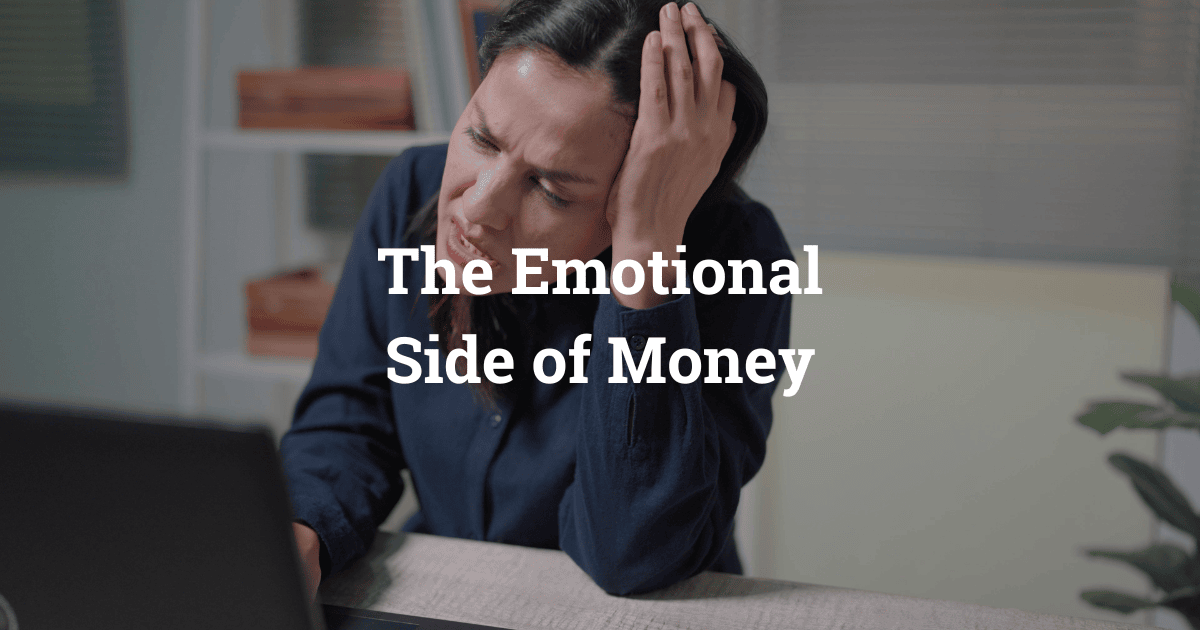Emotional Side Of Money: How Family Secrets Destroy Wealth And Trust
What Is the Emotional Side of Money?
Disclaimer: This article explores the emotional side of money and is intended for general informational purposes only. It is not a substitute for legal, financial, or professional advice. Every financial situation is unique, so please consult with a licensed attorney or estate planning professional for guidance tailored to your specific needs.
“Financial literacy isn’t just about understanding numbers—it’s about navigating the complex human dynamics that shape our relationship with money.”
A True Story That Reveals the Emotional Side of Money

Recently, I witnessed a real-life situation that perfectly captured what most financial education completely misses: the emotional complexity of money — especially during moments of grief and transition.
A young woman in her twenties had just lost her mother. In the aftermath, control of her inheritance was placed in the hands of a man in his forties — a long-time friend of her mother who hadn’t been present in her life for the past six years.
On paper, everything looked fine. The man had financial experience. The legal documents were in order. To the outside world, this seemed like responsible estate planning — still even a valid will doesn’t guarantee emotional clarity or fairness.
But what unfolded next had little to do with spreadsheets or tax efficiency — and everything to do with identity, power, and unspoken emotional wounds.
The man began referring to the young woman as “my daughter” and tried to guide her life choices as if he were a parental figure. She resisted fiercely. Arguments erupted. Her brother disengaged entirely. Their inheritance conflict turned into something much deeper — a clash of grief, autonomy, and unresolved roles.
When I spoke with them separately, I could see it clearly:
- She wasn’t just pushing back on financial control — she was fighting for her independence during a season of intense emotional pain.
- He wasn’t simply following a will — he was struggling to feel respected in a role he didn’t fully understand.
This wasn’t about money. It was about meaning.
This was the emotional side of money — and it’s where so many financial plans silently break down.
If you want to better understand how our beliefs and emotions shape financial decisions, The Psychology of Money offers powerful insights in a short, story-based format perfect for quiet reflection.
Why Financial Education Misses the Emotional Side of Money
This situation reveals a blind spot in the way we teach personal finance. Most financial education sticks to the technical: budgeting, investing, compound interest, tax strategies — all incredibly useful skills.
But what happens when financial trauma from past experiences shapes someone’s decisions? Or when unresolved grief hijacks their ability to think clearly? What happens when power, identity, and relationships become entangled with money?
Traditional approaches don’t answer those questions — and that’s the problem.
We’ve been taught to see financial choices as either rational or emotional — as if “rational” is always good and “emotional” is always bad. But in real life, the emotional side of money is always there. Ignoring it doesn’t make it disappear. It just makes financial planning incomplete.
Even the most “technically sound” financial plans can become relationally toxic if they fail to account for emotional dynamics — especially within family money dynamics. These emotional dynamics often explode in the aftermath of loss — even small estate decisions can trigger lasting family conflict, as Forbes explains.
The Emotional Layers Traditional Finance Leaves Out
Here are just a few of the emotional layers often overlooked in traditional financial literacy:
- Power & Control – Who gets to make decisions? How is financial authority defined, enforced, or contested?
- Identity & Autonomy – How does money support (or undermine) our sense of self and independence?
- Trust & Safety – What does financial security actually feel like, beyond the numbers?
- Grief & Transition – How do major life changes like loss or divorce affect financial choices?
- Connection & Belonging – How do money arrangements shape our relationships, roles, and emotional closeness?
Until financial education evolves to address these areas, we’ll keep seeing people — especially young adults — struggle through conflict, confusion, and deeply emotional experiences around money.
How to Navigate the Emotional Side of Money
Emotional Side of Money: Autonomy vs. Control
In the story I shared, the central tension was between financial control and personal autonomy — a dynamic that shows up in so many financial relationships:
- Spouses navigating income inequality
- Parents guiding adult children
- Business partners with different risk tolerances
- Financial advisors making decisions for emotional clients
The solution isn’t simply handing over full financial freedom. It’s about creating systems that balance protection with respect — something that becomes especially important when navigating the emotional side of money.
Here are three tools that help with that balance:
- Clear Financial Boundaries – Define specific areas of financial independence and interdependence to prevent confusion or power struggles.
- Graduated Financial Responsibility – Build a pathway toward increasing independence over time, especially after loss or major life transitions.
- Collaborative Decision-Making Tools – Use transparent frameworks that give everyone a voice in financial decisions and reduce financial control issues.

How Grief Impacts Financial Decisions
Some of the biggest financial decisions happen during the most emotionally intense seasons of life — loss, divorce, illness, job changes, and transitions into adulthood.
Even people who are normally confident with money can struggle during these moments. That’s because grief and money don’t operate on separate timelines. One affects the other in powerful ways.
When we don’t give ourselves space to process grief, we risk making decisions that don’t reflect our true needs — or that we later regret.
Here are three tools to help navigate the emotional side of money during seasons of transition:
- Create a Financial Pause Button – Delay non-urgent financial decisions after major loss or change. Give yourself time to grieve before acting.
- Separate Emotional Assets from Financial Assets – Ask yourself: Is this decision about money, or is it about something I’m feeling?
- Build a Transition Support Team – Surround yourself with emotional, legal, and financial support. You don’t have to go through it alone.
These tools don’t just protect your finances — they protect your well-being. Recognizing how grief can fuel emotional spending or avoidance is part of developing real financial wisdom.
One simple tool for emotional grounding during grief is a gratitude journal — helping you process heavy feelings while keeping your values front and center.

Setting Financial Boundaries for Emotional Wellbeing
One of the most powerful ways to prevent conflict around money is to set clear, healthy financial boundaries — not to shut people out, but to build a foundation of mutual respect and emotional safety.
In the story I shared, resolution came only after boundaries were named and honored. That’s often the turning point when the emotional side of money is involved.
Boundaries don’t mean control — they mean clarity.
Here’s a simple framework for setting effective financial boundaries in emotionally charged situations:
- Start with Appreciation – Acknowledge the other person’s intentions, efforts, or role in the situation.
- Name Specific Behaviors – Focus on what’s happening, not who they are. Use facts, not attacks.
- Share the Impact – Be honest about how those behaviors affect your emotions, finances, or decision-making ability.
- Make Clear, Doable Requests – Offer specific solutions or adjustments that feel fair to both sides.
When supported by regular check-ins, transparency tools, and shared values, boundaries don’t create distance — they create trust.
Redefining Financial Literacy Through the Emotional Side of Money
True financial literacy is about more than numbers. It’s about understanding how people actually relate to money — and how those relationships are shaped by identity, emotion, and power.
The emotional side of money doesn’t show up on a spreadsheet, but it influences every decision we make.
Expanding financial literacy means:
- Recognizing that every financial relationship carries emotional meaning
- Learning how to identify unmet needs and emotional triggers beneath financial conflict
- Building emotional intelligence around money, not just technical knowledge
- Creating systems that reflect not only your goals — but your values
Six months after the family I supported began setting boundaries, their dynamic had completely shifted. The young woman had the autonomy she needed to grieve and grow. The man had the respect and clarity he’d been searching for. And together, they created a new financial framework that worked for both of them — not just legally, but emotionally.
This is what financial wellbeing actually looks like.

Beyond the Numbers
The financial industry loves to focus on returns, rates, and accumulation. But the true measure of financial wellbeing isn’t just found in numbers — it’s in how those numbers support your relationships, your identity, and your emotional health. Even simple acts of self-care — like using a lavender diffuser while journaling or processing financial conversations — can support emotional clarity and ease.
When we embrace the emotional side of money, we move beyond spreadsheets and strategies. We begin building financial lives that reflect who we are, what we value, and how we want to show up in the world.
The next time you’re facing a money decision or conflict, pause and ask:
- What emotional need might be driving this behavior — mine or theirs?
- What boundary needs to be clarified or honored?
- How can I create space for both structure and emotional safety?
Because real financial empowerment doesn’t come from knowing all the rules — it comes from understanding the deeper why behind our choices.
-Jacqueline

Have a story to share?
Have you ever experienced financial tension that went way beyond the numbers — something tied to grief, control, or identity? You’re not alone.
Drop your story or thoughts in the comments. Your experience might help someone else feel seen.







